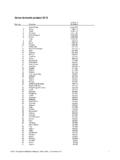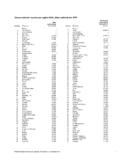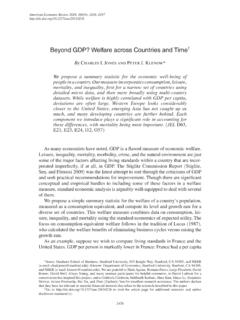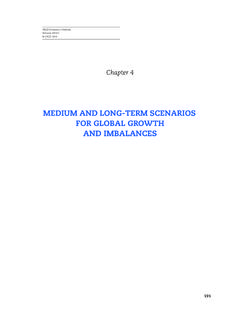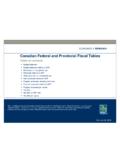Transcription of THE COSTS OF DATA LOCALISATION: FRIENDLY FIRE ON ECONOMIC ...
1 ECIPE OCCASIONAL PAPER No. 3/2014. THE COSTS OF data localisation : FRIENDLY fire ON ECONOMIC RECOVERY. Matthias Bauer Hosuk Lee-Makiyama Erik van der Marel Bert Verschelde Rue Belliard 4-6, 1040 Brussels, Belgium Phone +32 (0)2 289 1350. ECIPE OCCASIONAL PAPER. When you can measure what you are speaking about, and express it in numbers, you know something about it; but when you cannot express it in numbers, your knowledge is of a meagre and unsatisfactory kind.. Lord Kelvin SUMMARY. This paper aims to quantify the losses that result from data localisation require- ments and related data privacy and security laws that discriminate against foreign suppliers of data , and downstream goods and services providers, using GTAP8. The study looks at the effects of recently proposed or enacted legislation in seven jurisdictions, namely Brazil, China, the European Union (EU), India, Indonesia, South Korea and Vietnam. Access to foreign markets and globalised supply chains are the major sources of growth, jobs and new investments in particular for developing economies.
2 Manu- facturing and exports are also dependent on having access to a broad range of ser- vices at competitive prices, which depend on secure and efficient access to data . data localisation potentially affects any business that uses the internet to produce, deliver, and receive payments for their work, or to pay their salaries and taxes. The impact of recently proposed or enacted legislation on GDP is substantial in all seven countries: Brazil ( ), China ( ), EU ( ), India ( ), Indone- sia ( ), Korea ( ) and Vietnam ( ). These changes significantly affect post-crisis ECONOMIC recovery and can undo the productivity increases from major trade agreements, while ECONOMIC growth is often instrumental to social stability. If these countries would also introduce economy-wide data localisation require- ments that apply across all sectors of the economy, GDP losses would be even high- er: Brazil ( ), the EU ( ), India ( ), Indonesia ( ), Korea ( ). The impact on overall domestic investments is also considerable: Brazil ( ), China ( ), the EU ( ), India ( ), Indonesia ( ), Korea ( ) and Vietnam ( ).
3 Exports of China and Indonesia also decrease by as a conse- quence of direct loss of competitiveness. Welfare losses (expressed as actual ECONOMIC losses by the citizens) amount to up to $63 bn for China and $193 bn for the EU. For India, the loss per worker is equivalent to 11% of the average month salary, and almost 13 percent in China and around 20% in Korea and Brazil. The findings show that the negative impact of disrupting cross-border data flows should not be ignored. The globalised economy has made unilateral trade restric- tions a counterproductive strategy that puts the country at a relative loss to others, with no possibilities to mitigate the negative impact in the long run. Forced locali- sation is often the product of poor or one-sided ECONOMIC analysis, with the sur- reptitious objective of keeping foreign competitors out. Any gains stemming from data localisation are too small to outweigh losses in terms of welfare and output in the general economy.
4 2 No. 3/2014. ECIPE OCCASIONAL PAPER. INTRODUCTION. Over the past few years, there has been a widespread proliferation of regulatory restric- tions of the internet, in particular for commercial use. Whereas governments' earlier en- deavours to increase control over the internet had the implicit aim of keeping information outside state borders, this new breed of regulation aims at keeping data in. With the pretext of increasing online security and privacy, some governments are requiring mandatory stor- age of critical data on servers physically located inside the country, data localisation . Also, some data protection and security laws create barriers to cross-border data transfers to such an extent that they are effectively data localisation requirements. The belief that forcing personal information, emails and other forms of data from leaving the country would prevent foreign surveillance or protect citizens' online privacy is flawed in several ways.
5 First, many of the recent legislative proposals pre-date the surveillance rev- elations, and are not designed for addressing these issues. Second, information security is not a function of where data is physically stored or processed. Threats are often domestic , while storing information in one physical location could increase vulnerability. Thirdly, data localisation is not only ineffective against foreign surveillance, it enables governments to surveil on their own citizens. Moreover, users and business do not access data across borders with the purpose of evading domestic laws, while legal obligations do not always depend on where a server is physically placed. As a result, data localisation , or discriminatory privacy and security laws to similar effect, has spawned severe protest from advocates for open internet and the global trading system. Forced localisation is often the product of poor or one-sided ECONOMIC analysis, with the surreptitious objective of keeping foreign competitors out, or creating a handful of new jobs in e-commerce, data centres or consultancies.
6 However, any job gains as a result of data localisation are minuscule compared to losses in terms of jobs and output in other parts of the economy. Access to foreign markets through trade liberalisation and globalised supply chains are major sources of growth, jobs and new investments in particular for developing economies. Given the nature of today's globally interconnected economy, poorly designed national policies that increase data processing COSTS have a severe ECONOMIC impact as many sectors of the economy rely on digitally supplied services and goods. Manufacturing and exports sectors are also dependent on having access to a broad range of services at competitive prices such as logistics, retail distribution, finance or professional services which in turn are heavily de- pendent on secure, cost-efficient and realtime access to data across borders. When data must be confined within a country, it does not merely affect social networks and email services, but potentially any business that uses the internet to produce, deliver, and receive payments for their work, or to pay their salaries and taxes.
7 This paper aims to quantify the ECONOMIC losses that result from data localisation require- ments and related data privacy and security laws that discriminate against foreign suppliers of data . It does so by using a computable general equilibrium model (CGE) called GTAP8. (see Annex II), which is a well-acknowledged methodology that is frequently used for trade and ECONOMIC impact analyses by academia and policymakers worldwide. The study looks at the effects of the recently proposed or enacted legislation in seven jurisdictions, namely Brazil, China, the European Union (EU), India, Indonesia, South Korea and Vietnam. Some of these countries have conducted quantitative impact studies (notably the EU) measuring institutional or firm-level Yet, no public study by a market regulator has investigated 3 No. 3/2014. ECIPE OCCASIONAL PAPER. the effects on exports, gross domestic product (GDP) and consumer welfare as a result from proposed data localisation requirements or privacy laws.
8 OVERVIEW OF RELEVANT INTERNET AND PRIVACY REGULATIONS. The analysis looks at a number of recently introduced or proposed measures with respect to data localisation by conducting a survey in each of the aforementioned countries' juris- dictions. The measures are assumed to alter the COSTS of engaging in commercial activities in the selected countries (a brief description of all measures in each country can be found in Annex I). The way in which these primarily privacy and security related measures operate is of principal importance for accurate data modelling. For instance, data localisation require- ments are effectively disruptive bans of data processing and hence the foreign provision of that service into the domestic territory. The ban can be introduced economy-wide ( China, Vietnam), or selectively to a particular sector ( only financial services in Korea). Besides data localisation , a number of administrative regulatory barriers could be introduced through additional legal obligations that increase compliance COSTS , such as stricter con- sent requirements, a right to review personal information held by firms, the requirement to notify a market regulator and/or data subjects in case of potential security breaches.
9 Some measures are institutional such as the requirement to appoint a data privacy officer (DPO). within the organisation; while others increase business risks by introducing sanctions for non-compliance (in many cases with ambiguous laws), or a government's right to access a business proprietor's or its clients' data . Overall, compliance with these measures increases the operational expenditure of firms which raises domestic prices and non-tariff barriers (NTB) on imports. Therefore, in order to measure the actual or potential COSTS of introducing these measures, for this paper we have estimated the COSTS of all data localisation measures using two different scenarios: Scenario 1, which is based on the actual proposed regulations as defined in Table 1, including data localisation in each country as per today. Scenario 2, which is based on the actual proposed regulations, but with the addi- tion of a data localisation requirement applied to all sectors in each country.
10 TABLE 1: OVERVIEW OF REQUIREMENTS IN LEGISLATIVE PACKAGES. Brazil China EU28 India Indonesia Korea Vietnam data localisation requirement No Yes No Partial Yes Partial Yes Consent required for data Yes Yes Yes Yes Yes Yes No collection Consent required for transfer Yes Yes No Yes No Yes No to third parties Right to review No No Yes Yes Yes Yes No Right to be forgotten Yes Yes Yes No No Yes Yes Breach notification No Yes Yes No Yes Yes No Impact assessment No Yes Yes No No No No data privacy officers No No Yes No No Yes No Sanctions for non-compliance Yes Yes Yes Yes Yes Yes No Government access required Yes No No Yes No No Yes data retention requirement Yes No No Yes No No Yes 4 No. 3/2014. ECIPE OCCASIONAL PAPER. CONCEPTUAL MODELLING. The scenarios are calculated using several ECONOMIC shocks caused by data restrictions. If new regulations restrict businesses and individuals from using data in a reasonable man- ner prices of any good or service that uses data in its production would also increase.

